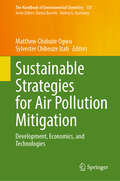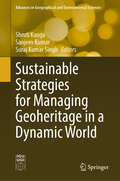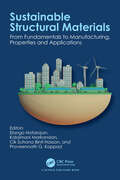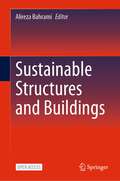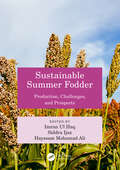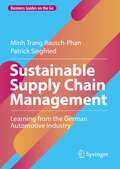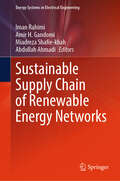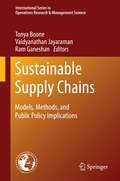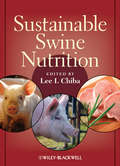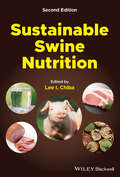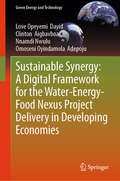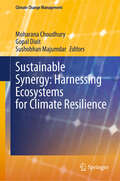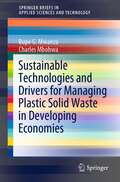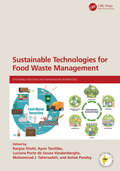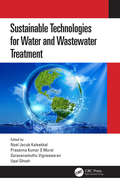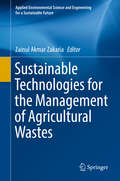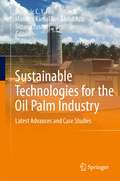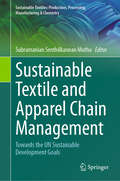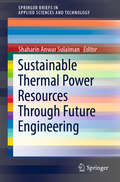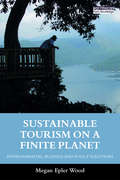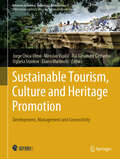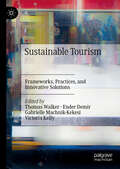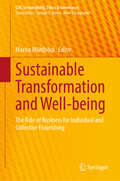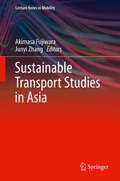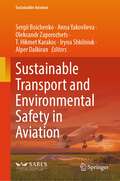- Table View
- List View
Sustainable Strategies for Air Pollution Mitigation: Development, Economics, and Technologies (The Handbook of Environmental Chemistry #133)
by Matthew Chidozie Ogwu Sylvester Chibeuze IzahThis book reviews air pollution, discussing its far-reaching impacts and presenting sustainable strategies to effectively address and mitigate these challenges. The book explores how addressing air pollution is in alignment with the United Nations Sustainable Development Goals, specifically SDG 3 (Good Health and Well-being), SDG 11 (Sustainable Cities and Communities), and SDG 13 (Climate Action). In this book, readers will find in-depth discussions on the effects of air pollution on human health, ecosystems, and the environment, underscoring the urgent need for effective mitigation strategies and the critical role of air pollution in driving climate change. The book also examines the economic impacts of air pollution and the disproportionate burden it places on vulnerable populations, emphasizing the importance of equitable public health policies and the necessity of social justice in pollution control efforts. Furthermore, this work presents sustainable strategies for managing air quality, stressing their significance for both human health and climate benefits. It provides an authoritative analysis of the policies and regulations crucial to achieving clean air, highlighting their role in reducing the adverse effects of air pollution on public health. Special attention is given to the latest technologies and innovations designed to mitigate air pollution. Together with its companion volume, "Air Pollutants in the Context of the One Health Approach: Fundamentals, Sources, and Impacts," this book serves as an essential resource for researchers, policymakers, students, and all those dedicated to tackling the complex challenges posed by air pollution and its far-reaching consequences for human health, the environment, and global sustainability.
Sustainable Strategies for Managing Geoheritage in a Dynamic World (Advances in Geographical and Environmental Sciences)
by Sanjeev Kumar Shruti Kanga Suraj Kumar SinghThis book delves deeply into the multifaceted challenges of geoheritage management today, including the ever-evolving geological landscape, human impact, and the pressing need for sustainable solutions. At its core, this book explores how sustainable practices can safeguard our geological treasures in the face of an ever-changing world. One of the book's primary takeaways revolves around the imperative of data-driven decision-making in geoheritage conservation. With the integration of cutting-edge technologies and methodologies, readers are exposed to the transformative power of data analytics, remote sensing, and geological mapping. By harnessing these tools, geoheritage managers and conservationists can analyze geological phenomena, monitor landform changes, and make informed decisions to protect and sustainably manage these irreplaceable natural wonders. Climate change, another critical theme of the book, is scrutinized from the perspective of its impact on geoheritage. Geological formations and landscapes are subject to climate-related alterations, ranging from erosion to shifts in flora and fauna. The book elucidates the innovative ways in which sustainable strategies can combat these effects, advocating for resilient geoheritage management practices that account for climatic variations. Furthermore, this book underscores the pivotal role of technology in preserving our geological heritage. From state-of-the-art monitoring devices to Geographic Information Systems (GIS) applications, readers are exposed to the tools and techniques that transforms geoheritage management. Real-world examples illustrate how these technologies are already being deployed, as well as their potential for further advancement to enhance sustainability.
Sustainable Structural Materials: From Fundamentals to Manufacturing, Properties and Applications
by Elango Natarajan Kalaimani Markandan Cik Suhana Binti Hassan Praveennath G. KoppadThe current trend is to develop novel sustainable composite materials to enhance their properties for use in wider range of applications. With an emphasis on SDG 9, SDG 11 and SDG 12, academicians and industrialists have intensified R&D on sustainable composite materials for use in myriad applications such as construction, membrane technology, water purification and energy capture. This book aims to provide comprehensive understanding of fundamentals, properties and applications of sustainable composite materials. The book, comprising of 21 chapters, promises to be highly beneficial for academicians and early career researchers working in the field of sustainable composite materials.
Sustainable Structures and Buildings
by Alireza BahramiThis open access book includes detail on various structures, buildings, and building materials from different structural and sustainability perspectives. It describes how the building industry is vital for the achievement of the sustainable development goals, namely, economic growth, social progress, and the effective protection of the environment. The aim of this collection is to foster the design and construction of sustainable structures and buildings to reduce the environmental load, connect with the environment, and benefit the health of occupants. Presenting the knowledge, trends, and developments from a group of contributors in the field working with different kinds of structures, structural components, buildings, and building materials, the book is ideal for practitioners working in commercial settings, as well as engineering students and researchers concerned with sustainability issues.
Sustainable Summer Fodder: Production, Challenges, and Prospects
by Imran Ul Haq Siddra Ijaz Hayssam Mohamad AliIncreasing human population pressure, especially in developing countries, indicates a massive increase in the consumption of livestock products. Fodder crops are the primary and cheapest source of feed for livestock, but feed shortages or poor-quality fodder are particular constraints to the world's livestock sector. These shortages affect milk production, adult and calf health, calving rates, and livestock numbers. Summer crops including cereal, legume, grass, and tree fodder, provide an economical source of nutrients suitable for animal health as well as improve their breeding efficiency. Sustainable Summer Fodder: Production, Challenges, and Prospects presents the unique opportunities and difficulties of supportable cultivation and growth of summer fodder crops and the various methods for enabling crop preservation. It details conventional modern approaches to sustainable production and advanced molecular approaches to develop high-yielding fodder crops. FEATURES Contains information on cultivation, growth, productivity, and protection from pests and diseases of various summer fodder crops Presents approaches to sustainable production, summarizes fodder preservation methods; and details molecular approaches to develop high-yielding fodder crops Provides insights into agronomic aspects of cereal, legume, grass, and tree species cultivated as summer fodder worldwide Discusses the trends in insect pests and diseases, their field identification, and various control methods This book is an essential resource for agronomists, horticulturalists, livestock farmers and practitioners, and students working in the field.
Sustainable Supply Chain Management: Learning from the German Automotive Industry (Business Guides on the Go)
by Patrick Siegfried Minh Trang Rausch-PhanThis book presents the current causes and effects of implementing sustainable supply chain management (SSCM) as well as green supply chain management (GSCM) strategies in the automotive industry. The reader is provided a detailed scientific review on SSCM and GSCM and presented the advantages of sustainable development concepts as well as factors causing the implementation of SSCM such as buyers’ behavior, governmental regulations, and competitiveness. The book then analyses the current situation of SSCM development, particularly in the automotive industry. It shows challenges, barriers, successes, and benefits that automotive companies obtain from implementing GSCM. Through case studies on leading German car manufacturers VW, BMW, and Daimler, the necessary activities of these companies to implement green development in the entire supply chain, including green supplier selection, green materials, green transportation, and reverse logistics, are defined. Moreover, a benchmark with companies from Asian markets such as Toyota from Japan and Geely from China is performed.
Sustainable Supply Chain of Renewable Energy Networks (Energy Systems in Electrical Engineering)
by Amir H. Gandomi Iman Rahimi Miadreza Shafie-Khah Abdollah AhmadiThis book examines the sustainable supply chain of renewable energy networks, combining global perspectives with engineering optimization. As the world shifts toward eco-friendly energy sources, it brings together experts to share best practices in solar, wind, marine, and biomass energy. The book covers innovative methodologies, real-world case studies, and aligns with the United Nations' Sustainable Development Goals. It serves as a vital resource for researchers, policymakers, and industry leaders. Additionally, students and educators will find it valuable for courses on sustainable energy systems, environmental policy, and renewable energy technologies. Whether for research, policy development, or education, this book is essential for understanding the evolving landscape of sustainable energy.
Sustainable Supply Chains
by Tonya Boone Ram Ganeshan Vaidyanathan JayaramanA sustainable enterprise is one that contributes to sustainable development by simultaneously delivering economic, social and environmental benefits or what has been termed "the triple bottom line." While pursuing profit, socially responsible companies should be sensitive to the environment and uphold the rights of all the firm's stakeholders. This edited volume explores leading-edge ideas -- both by academics and forward-thinking companies -- to (re)design and market products, source, manufacture, and eventually distribute and recover or dispose of them in an environmentally, ecologically, and socially responsible way. This edited volume is made up of fifteen chapters loosely grouped into clusters. After an introduction, chapter 2 shows the greenhouse emissions at various levels, from countries all the way to individual products. Chapters 3-7 each focus on an industrial sector and address issues specific to that industry, with chapter 7 presenting a case study on LEED certification of Miller Hall, home of the Mason School of Business where two of the authors (Tonya and Ram) work. Chapters 8-10 address product take back in the supply chain. Chapter 8 introduces e-waste and surveys what firms are doing to combat it. Chapter 9 provides an overview of existing take-back legislation and academic papers that have studied various research questions associated with them. Chapter 10 is a tutorial that addresses the problem of product disposition on a closed-loop supply chain: what should a firm do with a product return? Chapters 11-15 address measurement, monitoring, decision-making, and reporting regarding environmental issues in a firm. Chapter 11 provides an academic survey of eco-labeling and the consumer's willingness to pay for them. Chapter 12 discusses how firms can measure the total carbon footprint in their supply chains and some of the strategies they can use to mitigate carbon emissions. Using the price of call options, chapter 13 illustrates how managers can quantify the savings attributed to sustainability-related investment. Chapter 14 develops a non-linear optimization model that addresses the complex trade-offs involved in making joint operational and environmental decisions. Finally, chapter 15 develops a Data Envelopment Analysis-based method for supplier evaluation incorporating environmental and business factors.
Sustainable Swine Nutrition
by Lee I. ChibaFinding sustainable means of swine nutrition is important to both pork industry personnel and the environment alike. This reference comprehensively covers the most recent advancements in sustainability that results in more efficient diets, thus reducing both production costs and waste. Chapters include information on alternative feedstuffs, feed additives, bioavailabity of nutrients, and management of wastes and odors. Written by internationally recognized experts in the field, Sustainable Swine Nutrition will be a valuable reference for those involved in all aspects of pork production.Comprehensively covers the most recent advancements in sustainability to promote reduced pork production costs and wasteCovers recent topics such as alternative feedstuffs, feed additives, and bioavalabilityDiscusses environmental topics such as waste and odor managementWritten by an international team of experts in the field
Sustainable Swine Nutrition
by Lee I. ChibaSustainable Swine Nutrition As climate change continues to have a significant impact on the modern world, it is crucial to find alternative sources of energy and nutrients for swine production. The development of optimal feeding revolves around a multitude of considerations—genetic variations in the pig, variability, availability, and stability of nutrients in feed ingredients, interactions among nutrients and non-nutritive factors, voluntary feed intake, physical (& social) environment of pigs, and more. Establishing the ideal network of factors will only grow in importance as humans assess the methods for our own food networks. Sustainable Swine Nutrition is a comprehensive book on swine nutrition, covering some fundamental aspects of nutrition—namely digestive physiology, water, protein or amino acids, lipids, carbohydrates, energy metabolism, vitamins, minerals, and nutrition and immunology. Providing the most up-to-date information on each of these areas, a major emphasis of this second edition is on recent developments and current advances in the field, with a focus on pertinent issues linked with energy and nutrients. In doing so, the book highlights topics and issues that can contribute to the ultimate goal of successful and sustainable swine production. Sustainable Swine Nutrition readers will also find: Environmentally friendly, optimal feeding strategies for successful and sustainable swine production Recent developments, such as alternative feedstuffs, feed additives, and bioavailability Expanded treatment and new chapters on swine physiology, energy and protein, technology, and more Sustainable Swine Nutrition, Second Edition, is an ideal resource for livestock scientists and industry professionals involved in all aspects of pork production.
Sustainable Synergy: A Digital Framework for the Water-Energy-Food Nexus Project Delivery in Developing Economies (Green Energy and Technology)
by Clinton Aigbavboa Nnamdi Nwulu Omoseni Oyindamola Adepoju Love Opeyemi DavidThis book introduces a comprehensive and sustainable project delivery framework tailored for managing the Water, Energy and Food (WEF) nexus in developing economies. Its primary objectives include establishing the determinants of the nexus, exploring the sustainability dynamics of the resources, delineating the role of digital technologies in WEF nexus projects, evaluating the interoperation of the three resources with sustainable development goals (SDGs) and subsequently formulating a sustainable project delivery framework. Timely in its release, the book provides essential policy directions and technological perspectives within the realms of sustainability. Water, energy, and food (WEF) resources constitute vital components pivotal for a nation's socio-economic development and fundamental for human survival due to their intricate interdependencies. Recognizing their paramount importance, the World Economic Forum underscores their role in a country's growth trajectory. However, the sustainable management of WEF resources in the era of the Fourth Industrial Revolution necessitates an integrative framework for project delivery. Unfortunately, a significant gap exists in understanding the determinants of the nexus between water, energy, and food resources, resulting in insecurity in their management. Compounding this challenge, the emergence of new technologies in the fourth industrial revolution has not received adequate consideration for ensuring resource security. The book adopts a meticulous approach, conducting an in-depth review of existing models, frameworks, and theories. Furthermore, it supplements this analysis with an insightful interview case study. Notably, this pioneering work distinguishes itself as the first to view WEF resources as interconnected nexus projects, with a keen acknowledgment of the indispensable role played by digital technology. Moreover, its targeted focus on addressing the unique challenges prevalent in developing economies adds a layer of specificity often absent in existing literature on the WEF nexus. Researchers seeking a deeper understanding of the integration between the WEF nexus and digital technologies will find substantial value in the contents of this book. The book is divided into five sections, providing a systematic exploration of the subject. The sections cover background information on WEF resources and its nexus, underpinning theories of resource interaction, theoretical frameworks relevant to the nexus, the role of digital technologies in managing the WEF nexus, interoperation of sustainability and SDG with the nexus, presentation of an in-depth case study and conclude with valuable insights and recommendations.
Sustainable Synergy: Harnessing Ecosystems for Climate Resilience (Climate Change Management)
by Sushobhan Majumdar Moharana Choudhury Gopal Dixit"Sustainable Synergy: Harnessing Ecosystems for Climate Resilience" will assemble a diverse collection of expert perspectives to explore the crucial relationship between ecosystems and climate resilience comprehensively. This groundbreaking volume will bring together leading voices from various disciplines to present a multifaceted examination of ecosystems' role in addressing the challenges posed by climate change. Divided into thematic sections, the edited volume will begin with a deep dive into the intricate dynamics of ecosystems, providing a foundation for understanding their inherent resilience mechanisms. Contributors, including renowned scientists, researchers, and practitioners, dissect the current climate crisis and elucidate how important ecosystems can be in mitigating its effects. The strength of this edited volume will lie in its synthesis of cutting-edge research, case studies, and innovative strategies for sustainable environmental management. Each chapter will contribute a unique perspective, exploring biodiversity conservation, ecosystem restoration, and integrating indigenous knowledge into climate resilience efforts. Beyond theoretical discussions, the book will strongly emphasise practical applications. Contributors share successful, real-world examples of ecosystem-based solutions, highlighting projects demonstrating tangible results in enhancing climate resilience. These case studies provide inspiration and guidance for policymakers, conservationists, and anyone committed to fostering a sustainable future. The interdisciplinary nature of "Sustainable Synergy" will foster a holistic understanding of the complex issues surrounding climate resilience. The edited volume will be formulated to be accessible to a broad audience, including academics, practitioners, policymakers, and students. Its structure will facilitate an engaging journey through ecology, climate science, and environmental policy, making it an invaluable resource for those seeking a comprehensive overview of the subject. As the global community grapples with the escalating impacts of climate change, "Sustainable Synergy: Harnessing Ecosystems for Climate Resilience" stands out as a seminal contribution. By bringing together diverse perspectives, this collection will serve as a dynamic resource that informs and inspires collective action toward a more resilient and sustainable future. In the face of unprecedented environmental challenges, this edited volume will emerge as a guiding light for those committed to leveraging the power of ecosystems for climate resilience.
Sustainable Technologies and Drivers for Managing Plastic Solid Waste in Developing Economies (SpringerBriefs in Applied Sciences and Technology)
by Charles Mbohwa Bupe G. MwanzaThis book discusses sustainable waste management technologies for managing end-of-life (EoL) post-consumer and packaging plastic solid waste (PSW) from domestic and commercial waste streams. It does so particularly in the context of providing a way forward for developing economies.Treating recycling and composting of, and energy recovery from, plastics, the book is directed at individuals who are responsible for or have a significant role in solid waste management. Academics and students in solid waste management pursuing research or study in solid waste management with particular interest in plastics will find this book useful. Sustainable options for managing PSW are presented with reference to the scientific, engineering, and management standpoints to enable decision makers and relevant stakeholders in industry arrive at the best decision for achieving sustainable resource management. The book further integrates waste management and technologies so that PSW recycling can be viewed from environmental, economic, and social perspectives. Greener technologies for PSW management are addressed so as to provide drivers that will influence key stakeholders and policy-makers achieve sustainability in this field.
Sustainable Technologies for Food Waste Management (Sustainable Industrial and Environmental Bioprocesses)
by Ranjna Sirohi, Ayon Tarafdar, Luciana Porto de Souza Vandenberghe, Mohammad J. Taherzadeh, and Ashok PandeyThis book comprehensively explores various aspects of food waste management, ranging from understanding the issue to innovative solutions that convert waste into valuable resources. The initial chapters provide an in-depth analysis of advanced methods for characterizing food waste. The book examines cutting-edge methodologies, including physico-chemical, thermal, and biological approaches, for converting food waste into valuable resources such as biohydrogen, biopolymers, biogas, organic acids, bioactive compounds, biochar, compost, and vermicompost. Additionally, it delves into the utilization of advanced technologies like machine learning, the Internet of Things (IoT), sensors, and robotics for food waste treatment and management, thus contributing to a sustainable future. It underscores the conversion of food waste into renewable energy sources, sustainable materials, and valuable compounds. This book will be useful for researchers, practitioners, and policymakers seeking sustainable approaches to tackle the global challenge of food waste. Offers in-depth insights into advanced methods for characterizing food waste, enabling precise and targeted waste reduction strategies Examines physico-chemical, thermal, and biological approaches for converting food waste into valuable resources Presents machine learning, IoT, sensors, and robotics for sustainable food waste management and treatment Highlights the conversion of food waste into valuable resources, including biohydrogen, biopolymers, bioactive compounds, compost, and vermicompost Provides specific details about the food waste supply chain and associated policies
Sustainable Technologies for Water and Wastewater Treatment
by Noel Jacob KaleekkalSustainable Technologies for Water and Wastewater Treatment discusses relevant sustainable technologies for water and wastewater treatment pertaining to a nanoscale approach to water treatment and desalination, membrane-based technologies for water recovery and reuse, the energy and water nexus, degradation of organic pollutants, nascent technologies, bio and bio-inspired materials for water reclamation and integrated systems, and an overview of wastewater treatment plants. The book focuses on advanced topics including in situ generation of hydroxyl radicals, which can aid in the indiscriminate oxidation of any contaminant present in wastewater, making advanced oxidation processes commercially viable. Features: A comprehensive review of current and novel water and wastewater treatment technologies from a sustainability perspective All the sustainable technologies, such as desalination, wastewater treatment, advanced oxidation processes, hydrodynamic cavitation, membrane-based technologies, sonosorption, and electrospun fibers Discussion on reference materials for important research accomplishments in the area of water and environmental engineering Theoretical aspects covering principles and instrumentation A summary on sustainability, including life cycle assessment (LCA), energy balance and large-scale implementation of advanced techniques This book is aimed at professionals, graduate students, and researchers in civil, chemical, environmental engineering, and materials science.
Sustainable Technologies for the Management of Agricultural Wastes
by Zainul Akmar ZakariaThis book discusses modern technologies for utilizing various types of agricultural waste as a direct means of properly managing its abundance. It explores the potential of using waste materials obtained from the palm oil industry, used cooking oil, maize and tea plantations, as well as citrus-based plants for the production of useful, high-value materials such as pyroligenous acid and bio-oil (Chapter 1), ferulic acid (Chapter 4) and bio-control agents (Chapter 5-7, 9). It also includes case studies to further enhance readers’ understanding. This comprehensive volume is useful to anyone involved in agricultural waste management, green chemistry and agricultural biotechnology. It is also recommended as a reference work for all agriculture and biotechnology libraries.
Sustainable Technologies for the Oil Palm Industry: Latest Advances and Case Studies
by Mustafa Kamal Tun Abdul Aziz Dominic C. Y. Foo Suzana YusupThis book reports the latest research and successful industrial case studies on sustainable technologies in the oil palm industry, ranging from plantation, processing to waste handling. It covers the latest developments on harvesting, refining, nanomaterial production, aviation biofuel, biomass supply chain and waste treatment and handling. This book is a continuation of a previously published Springer book 'Green Technologies for the Oil Palm Industry' and is intended for industrial practitioners and academics interested in sustainable technologies for palm oil milling processes.
Sustainable Textile and Apparel Chain Management: Towards the UN Sustainable Development Goals (Sustainable Textiles: Production, Processing, Manufacturing & Chemistry)
by Subramanian Senthilkannan MuthuThis book provides a variety of cases at the intersection of the United Nations 17 Sustainable Development Goals (SDGs) and sustainable textile and apparel supply chain management. The cases presented detail the relationship between apparel production and consumption and the SDGS and explore and how the textile and apparel industry can contribute to achieving these goals along the supply chain.
Sustainable Thermal Power Resources Through Future Engineering (SpringerBriefs in Applied Sciences and Technology)
by Shaharin Anwar SulaimanThis book presents recent research in the field of nonconventional and renewable energy, and energy efficiency in the context of thermal power. It addresses energy-efficiency and environmental issues that are critical in the production of thermal power, and also examines various applications, especially air conditioning, internal combustion engines, and solar electric power plants.
Sustainable Tourism on a Finite Planet: Environmental, Business and Policy Solutions
by Megan Epler WoodThis book helps all those involved in international tourism develop the new skills, tools and investments required to protect irreplaceable global resources from the impacts of escalating tourism demand over the next 50 years. It documents how technology and the growing global middle class are driving a travel revolution which requires a new paradigm in managing tourism destinations. Travel and tourism supply chains and business models for hotels, tour operators, cruise lines, airlines and airports are analysed and environmental management techniques are proposed for each sector. A pragmatic set of solutions are offered to support the transition to lower impact tourism development worldwide. It recommends that decision makers assess the current and future value of natural, social, and cultural capital to guide investment in destinations and protect vital resources. Case studies illustrate why budgets to protect local destinations are consistently underestimated and offer guidance on new metrics. Innovative approaches are proposed to support the transition to green infrastructure, protect incomparable landscapes, and engage local people in the monitoring of vital indicators to protect local resources. It provides students, professionals, and policy makers with far-reaching recommendations for new educational programs, professional expertise, financing, and legal frameworks to lower tourism’s rapidly escalating carbon impacts and protect the health and well-being of local populations, ecosystems, cultures, and monuments worldwide.
Sustainable Tourism, Culture and Heritage Promotion: Development, Management and Connectivity (Advances in Science, Technology & Innovation)
by Uglješa Stankov Rui Alexandre Castanho Jorge Chica-Olmo Miroslav Vujičić Eliana MartinelliThis proceedings book explores future prospects of cultural, heritage, and religious tourism and how it can impact the socioeconomic complexity of a community and future developments. It includes chapters on contemporary digital age pilgrimage, digital interpretation as a management strategy, tourism in the era of digital communication, and the role of social media in conserving intangible cultural heritage. This book focuses on policies and mechanisms for heritage preservation. It includes cultural heritage tourism management, how the digitalization of data has impacted and further developed tourism, World Heritage classification in urban tourism destinations, cultural tourism products, and experiences. Moreover, it discusses the sustainable environment and geography in tourism. It covers topics such as ecotourism and rural sustainable development, heritage in socioeconomic sustainable development, and tourists' perceptions of tourism. Anotherpart of the book explores the social and economic impacts of tourism. It includes chapters on cycling tourism along the Elbe, residents' perceptions of the socioeconomic benefits of restaurants, architecture of historical mosques, tourism as a driver of soft power, tourists' perceptions of service quality, tourism during the Covid-19 pandemic, gastronomic narratives in tourism, and residents' perceptions of festivals. Also, it pinpoints the focus on user interaction-based development. It includes chapters on the role of community-led initiatives in heritage revitalization and addressing connectivity issues between historical and natural touristic heritage sites. These research papers provide valuable insights into the multidimensional nature of cultural sustainable tourism, covering a wide range of topics and offering diverse perspectives on its development, management, and impact.
Sustainable Tourism: Frameworks, Practices, and Innovative Solutions
by Thomas Walker Victoria Kelly Ender Demir Gabrielle Machnik-KekesiThis edited volume aims to ignite an academic discussion regarding necessary, and urgent, adaption and mitigation strategies for the tourism industry. Now more than ever, there is a need for designing and implementing concrete strategies for a world in which tourism practices are sustainability-minded, not only to rescue this key industry from the devastating effects of the COVID-19 pandemic, but also to limit the effects that it has on pollution, climate change, and at-risk populations. Achieving this goal will require innovations that can help us synchronously adapt to committed change as well as shift our planning processes and alter our behaviours. Including contributions from international experts in the fields of tourism management, economics, political science, finance, business, and sustainability, this book provides much-needed research on sustainable tourism by evaluating current and future trends, global contributions, case studies and new research evaluating issuessuch as over-tourism and under-tourism, as well as the general effects that tourism have on a region’s economy, environment, culture, and society. In addition, it will explore how sustainable tourism can help alleviate, mitigate, or control these problems. This book aims to provide insight into how we can still enjoy and benefit from touristic travel while implementing appropriate strategies and adaptation plans in the areas of health, culture, the economy, and the environment and showcase investigations of alternative tourism frameworks and tourist perspectives. It will be of great interest to academic and practitioner communities in business and policy, as well as economics, tourism management, development studies, finance, cultural heritage management, policymaking and entrepreneurship.
Sustainable Transformation and Well-being: The Role of Business for Individual and Collective Flourishing (CSR, Sustainability, Ethics & Governance)
by Marisa MühlböckIn an era of undeniable human impact on the planet, can business drive sustainable development and enhance well-being for all? This book explores the evolving concept of well-being through a transdisciplinary lens, bridging sustainability, business, and collective flourishing. It examines the business sector's transformative role in promoting well-being through sustainable practices. Featuring insights from diverse disciplines and cultures, the book provides case studies, strategies, and resources for entrepreneurs and managers to achieve well-being in work and life. With contributions from leading scientists, it maps the current landscape, identifies gaps, and sparks new research on linking individual, societal, and planetary well-being. A must-read for those seeking to understand how business can foster a sustainable, well-being-driven future.
Sustainable Transport Studies in Asia
by Akimasa Fujiwara Junyi ZhangThis book aims to provide a good understanding of and perspective on sustainable transport in Asia by focusing on economic, environmental, and social sustainability. It is widely acknowledged that the current situation and trends in transport are not always sustainable in Asia, due in part to the fast-growing economy and the astounding speed of urbanization as well as least-mature governance. As essential research material, the book provides strong support for policy makers and planners by comprehensively covering three groups of strategies, characterized by the words "avoid" (e.g., urban form design and control of car ownership), "shift" (e.g., establishing comprehensive transportation systems and increasing public transportation systems for both intracity and intercity travel), and "improve" (e.g., redesign of paratransit system, low-emission vehicles, intelligent transportation systems, and eco-life). These are elaborated in the book alongside consideration of the uncertainty of policy effects in the future. The book is also valuable for scholars and scientists because of the diverse methodologies presented and proposed herein. Among those are the four-step model with full feedback mechanisms, the bi-level programming model with sustainability goals, data envelopment analysis and stochastic frontier analysis approaches, structural equation models, discrete and/or continuous choice models, copula-based models, survival models, and driving risk models with short-term memory. Using data collected from more than ten Asian cities, including those in both developed and developing nations, the pathway to sustainable transport in Asia gradually becomes clear.
Sustainable Transport and Environmental Safety in Aviation (Sustainable Aviation)
by T. Hikmet Karakoc Alper Dalkiran Sergii Boichenko Anna Yakovlieva Oleksandr Zaporozhets Iryna ShkilniukThis book looks at sustainability and the environmental safety of transport, both key priorities within the global strategy of sustainable development of aviation. Bringing together selected papers presented at the 8th International Scientific-Technical Conference: Problems of Chemmotology – Theory and Practice of Rational Use of Conventional and Alternative Fuels and Lubricants, the contributions examine the theory and practice of aviation chemmotology and safety in transport, including sustainable transport, manufacturing and use of conventional and alternative fuels and lubricants, the use of electric aviation, and systems of fuel supply and fuel infrastructure. This collection will be an invaluable reference for researchers, professionals, and students involved in alternative aviation fuels, transport engineering, sustainable transport development, and fuels and lubricants.
